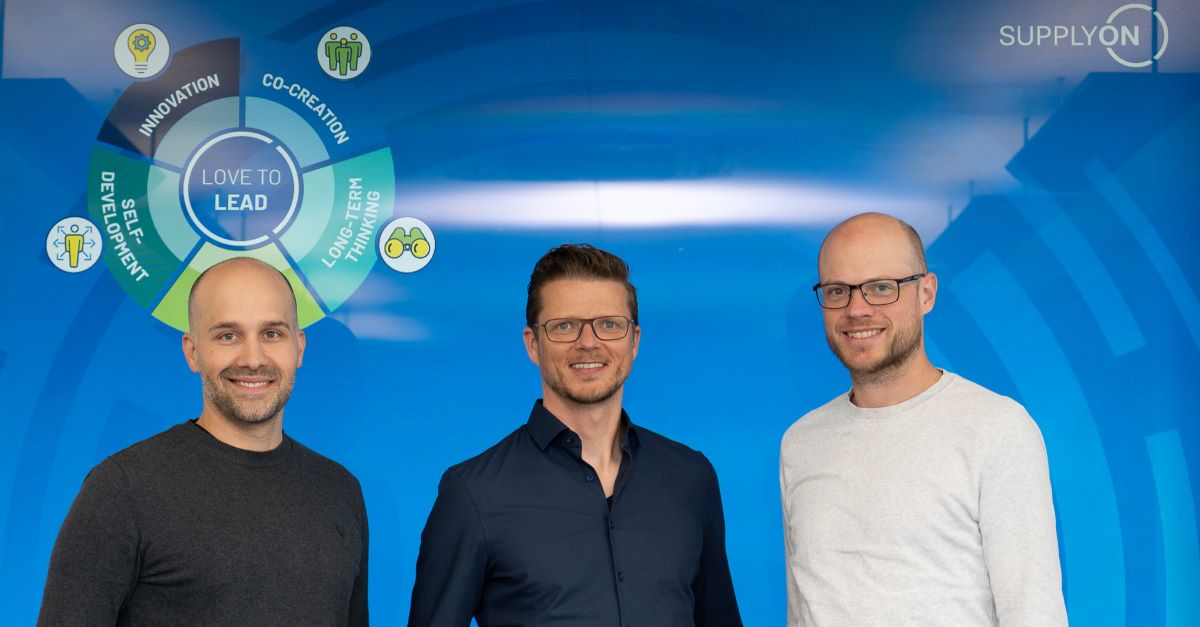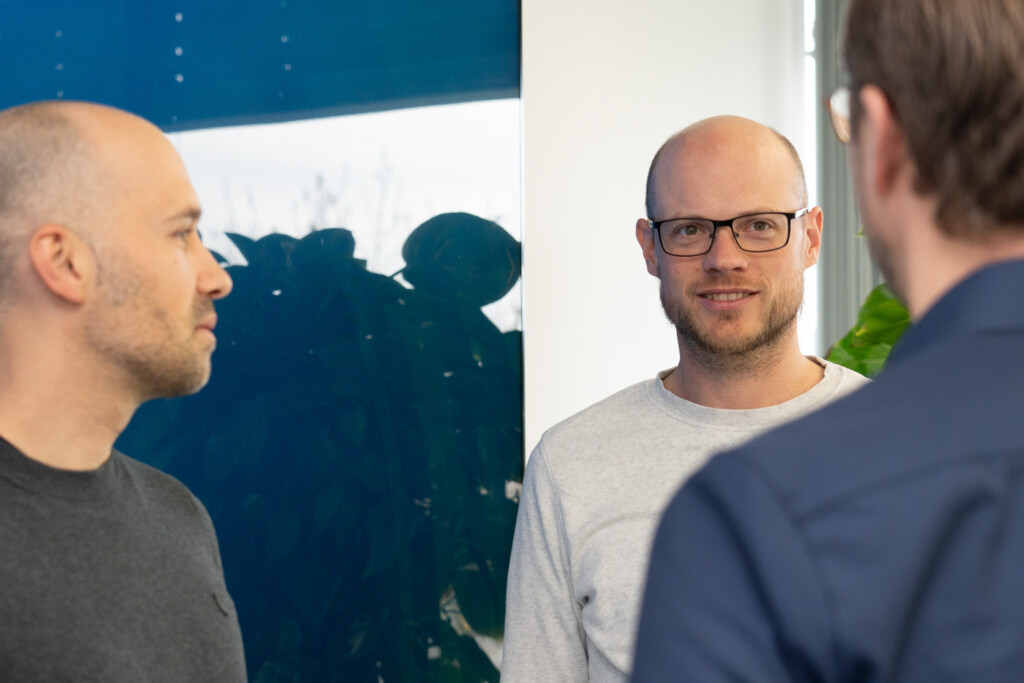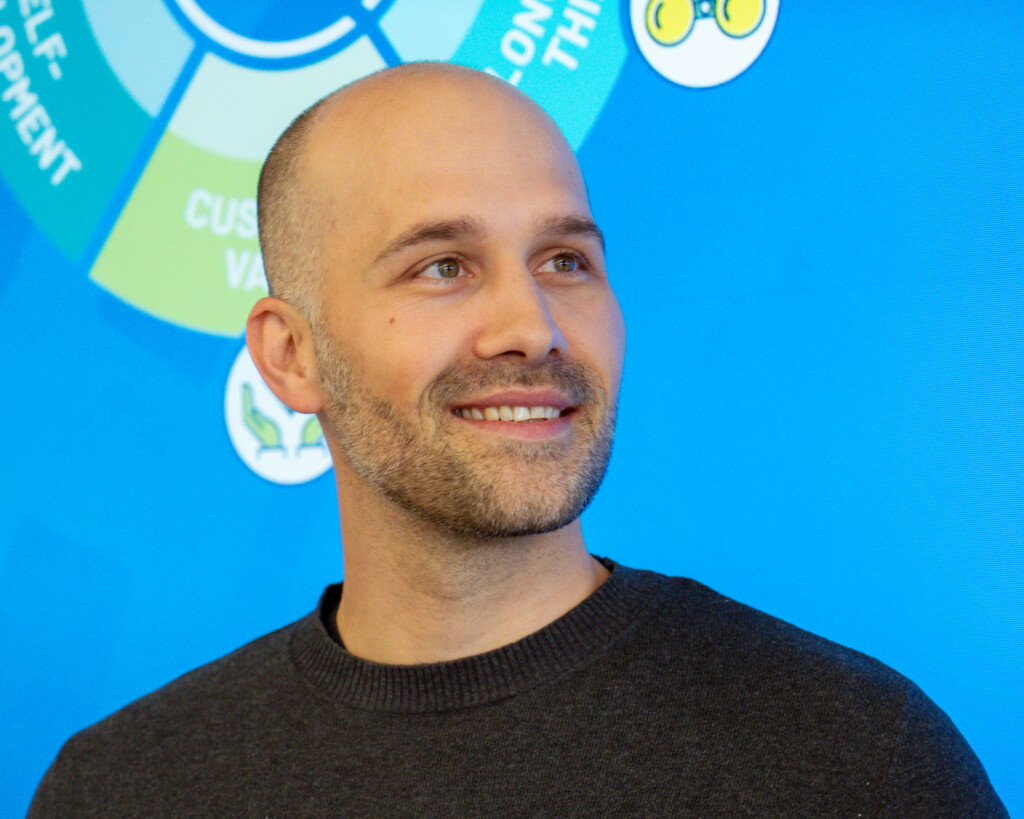LOVE TO LEAD: employees provide insight into actively practiced and shaped leadership culture

At the beginning of February 2024, our SupplyOn Leadership understanding was rolled out at a kick-off meeting with all employees. Developed by employees for employees, a team consisting of 16 change agents – with and without management responsibility – and the SupplyOn Vice Presidents played a key role in defining and developing the SupplyOn Leadership values and principles.
Today, three of them are answering our questions about the impact and application of the LOVE TO LEAD leadership initiative: Korbinian Reng is Vice President of Portfolio Strategy & Marketing, Marian Wilken is Team Leader in Consulting and Dominik Maier is Product Manager and responsible for AirSupply Quality.
Dominik, Marian and Korbinian, you have played a key role in shaping SupplyOn’s leadership values and principles. Can you describe why leadership affects all employees across the hierarchy and not just managers?
Marian: I don’t think a change initiative can work if everyone just looks at their manager and waits to see what they do. Otherwise, all that’s left at the end is the Management Board, which is then supposed to somehow lead the way.
However, we have many substantive topics and we have experts for these topics. These tasks need to be led and driven forward. We need leaders who lead the way. And these must be the thematic specialists, they must be every single one of us. Because that’s the only way we can develop.
Dominik: In the role of Product Manager or Product Owner at SupplyOn, you have technical responsibility for the product even without disciplinary leadership. You also manage the product in the sense that it is constantly improving, which puts you in a functional management role.
Korbinian: I think that’s exactly the core of it. People often talk about ownership – but leadership goes a bit further: for example: I not only take responsibility for my topic, but I also lead my topic to success. I lead my colleagues, I lead my customers, I lead my boss. That is also something you can and must do. That’s why all of our employees have a leadership role, regardless of their position within SupplyOn.
Anchoring this as a leadership value now empowers every employee once again. True to the motto: “Do it and lead yourself.”

How do you interpret the “LOVE TO LEAD” approach in your day-to-day work in relation to how you live leadership?
Korbinian: LOVE TO LEAD stands for passion. As a manager, I believe it has to be fun to work with people and to want to tease out the best possible potential from each person. At the same time, I am also an employee and project manager. I am passionate about driving my topics forward, and this can be broken down into all five leadership values – innovation, self-development, co-creation, customer value and long-term thinking.
A few examples:
Innovation: I want our solutions to be better, smarter and simpler.
Self-development: I want to continue my professional development, both internally and externally.
Customer value: I want to build something that offers our customers real added value.
LOVE TO LEAD can therefore be found everywhere in my day-to-day work and I can apply it in many places.
Marian: For the consulting sector and my team, LOVE TO LEAD means above all leading the customer. I see LOVE TO LEAD as going beyond the values and into leadership. To take the customer with us and lead them towards the goal that we have very specifically in the respective project. To simply live “leading”!

Can you pick out one of the five leadership values and describe how it influences your decisions in your area of work and interactions with team members on a daily basis?
Dominik: For me, co-creation has always been very important. We have now codified the value and refined it through the principles, but the principle of achieving very good results as a team – and not as a lone fighter – still influences me. The result is better thanks to the different perspectives from the team. I think it’s great that the value as a leadership topic has been given this importance, as it also encourages people to get involved, to express other perspectives or concerns, which further strengthens collaboration.
Marian: As change agents, we have formed teams for certain values. As I am in the co-creation team, I would also pick out this value in my example. For me, working on co-creation within the leadership initiative has led me to think even more specifically about dependencies and synergies:
I am increasingly asking myself questions such as: What are the departments relevant to me, the teams relevant to me that we work with a lot? Do these teams have conflicting goals and how can we identify and address these internally together in advance?
How can we present to the customer together in the same direction so that the best possible result is achieved for all departments and, of course, especially for the customer?
Korbinian: I would like to talk about the value of innovation. You have to be hungry and enthusiastic to innovate. You have to be willing to question things and keep trying out new ideas.
Because in everyday life, it’s rarely the case that a great idea is thrown into the room and everyone shouts “hurrah” and runs off. This brings us back to the value of co-creation: you have to approach your colleagues to understand how you can convince and inspire them. That’s exciting because everyone has a different way of thinking. And of course, when it comes to innovation, you also need staying power. The leadership values and principles provide support here and encourage everyone: “Keep at it and keep going.”

How do you experience the implementation of “LOVE TO LEAD” in your daily work? Are there any examples you would like to share?
Dominik: I think that the formulation of the leadership values and principles has an impact on our day-to-day work. A personal example I gave last week, for example, was when a customer communicated a new requirement to me regarding the data exchange of documents. Coincidentally, the customer communicated this new requirement to me. But I realized that this would also affect many other departments at SupplyOn that work for this customer. So, I took responsibility for this and, in the spirit of co-creation, felt obliged to inform all other affected teams about the upcoming change. The other teams were very happy because they were not yet aware of this requirement and now had the opportunity to act with foresight. In my view, this sharpening of a shared sense of responsibility is also what makes the values so important.
Korbinian: Absolutely! I’m fascinated by what has already happened in the short time since the presentation in February 2024. I’ve seen employees stand up in meetings and say: “Guys, why are we discussing this now, why should we wait here for hierarchical decisions, let’s take the lead ourselves, live leadership and decide together.”
And I have already seen an invitation to an appointment being canceled with the explanation: “I’m blocking this time slot for my personal development, this webinar is important to me. You said we should take responsibility for our self-development 😉.”
Marian: I can confirm that! I’ve also noticed a lot of discussion about leadership values and principles. People are thinking about them, questioning their meaning and looking for answers to the questions:
What does this mean in concrete terms for us as a team?
What measures can we take within our team?
How can we bring the values to life in our everyday lives?
Or to put it another way: what do we need to bring them to life?
I receive feedback that colleagues feel that the leadership initiative has added value for them. They are motivated to work on things, to help shape their entire working day and the future against the backdrop of the leadership values.
It is tangible that LOVE TO LEAD increases commitment and satisfaction within the company. People are keen to drive issues forward and that makes me even happier as a manager in my day-to-day work.
Dominik: The great thing about the initiative is that it was broadly based right from the start and that a cross-section of employees was involved. Even without disciplinary leadership, I personally found it very exciting to be part of it. There was a positive energy right from the start. And that has carried people along and is now helping us to drive this topic forward.
Incorporating so many different perspectives was probably the key to anchoring these topics in a sustainable way so that everyone at SupplyOn can identify with the values and principles.

As change agents, you are also mentors for a specific leadership value and are available to all employees for questions and in-depth knowledge. What tips can you give employees to bring the leadership values to life in everyday life and actively contribute to the further development of the leadership culture?
Korbinian: Be brave, dare to do it! Do you have a good idea? Talk about it with your manager, with division heads, with vice presidents – with whoever – if you are convinced that you have a good idea, then push it forward!
Marian: It’s a matter of type. You have to want to help shape things in order to fully exploit the potential of LOVE TO LEAD for yourself. And of course, it’s okay if you don’t see yourself in an active role. Nevertheless, I recommend that you don’t sit down and wait for someone else to make you happy but use the opportunity to fill the values with life and get the most out of them for the company and for yourself personally.
Korbinian: In my opinion, it’s important to involve every employee. There are many people who don’t like to push themselves to the fore as spokespeople, who tend to be quiet in groups or workshops. But these employees often have real treasures inside them in terms of ideas, opinions and observations. As managers, we have the opportunity to involve these employees, to encourage them to be bold so that we can unearth this treasure together.
Marian: Some questions keep coming back to me:
What’s next for LOVE TO LEAD?
What comes next?
How will this be put into practice now?
The short, concise answer to this is: There are topics that we are working on from the values teams. But ask yourself the same question: What do the leadership values and principles mean to you? Which topics are important to you and would you like to advance yourself?



